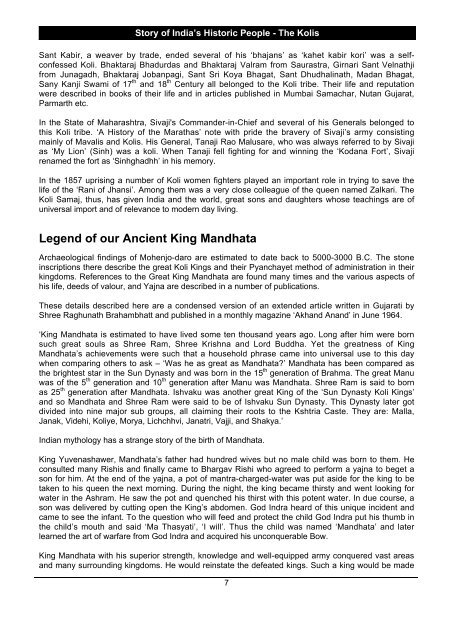THE ASSOCIATION OF MANDHATA SAMAJ UK - Mandhata Global
THE ASSOCIATION OF MANDHATA SAMAJ UK - Mandhata Global
THE ASSOCIATION OF MANDHATA SAMAJ UK - Mandhata Global
You also want an ePaper? Increase the reach of your titles
YUMPU automatically turns print PDFs into web optimized ePapers that Google loves.
Story of India’s Historic People - The Kolis<br />
Sant Kabir, a weaver by trade, ended several of his ‘bhajans’ as ‘kahet kabir kori’ was a selfconfessed<br />
Koli. Bhaktaraj Bhadurdas and Bhaktaraj Valram from Saurastra, Girnari Sant Velnathji<br />
from Junagadh, Bhaktaraj Jobanpagi, Sant Sri Koya Bhagat, Sant Dhudhalinath, Madan Bhagat,<br />
Sany Kanji Swami of 17 th and 18 th Century all belonged to the Koli tribe. Their life and reputation<br />
were described in books of their life and in articles published in Mumbai Samachar, Nutan Gujarat,<br />
Parmarth etc.<br />
In the State of Maharashtra, Sivaji's Commander-in-Chief and several of his Generals belonged to<br />
this Koli tribe. ‘A History of the Marathas’ note with pride the bravery of Sivaji’s army consisting<br />
mainly of Mavalis and Kolis. His General, Tanaji Rao Malusare, who was always referred to by Sivaji<br />
as ‘My Lion’ (Sinh) was a koli. When Tanaji fell fighting for and winning the ‘Kodana Fort’, Sivaji<br />
renamed the fort as ‘Sinhghadhh’ in his memory.<br />
In the 1857 uprising a number of Koli women fighters played an important role in trying to save the<br />
life of the ‘Rani of Jhansi’. Among them was a very close colleague of the queen named Zalkari. The<br />
Koli Samaj, thus, has given India and the world, great sons and daughters whose teachings are of<br />
universal import and of relevance to modern day living.<br />
Legend of our Ancient King <strong>Mandhata</strong><br />
Archaeological findings of Mohenjo-daro are estimated to date back to 5000-3000 B.C. The stone<br />
inscriptions there describe the great Koli Kings and their Pyanchayet method of administration in their<br />
kingdoms. References to the Great King <strong>Mandhata</strong> are found many times and the various aspects of<br />
his life, deeds of valour, and Yajna are described in a number of publications.<br />
These details described here are a condensed version of an extended article written in Gujarati by<br />
Shree Raghunath Brahambhatt and published in a monthly magazine ‘Akhand Anand’ in June 1964.<br />
‘King <strong>Mandhata</strong> is estimated to have lived some ten thousand years ago. Long after him were born<br />
such great souls as Shree Ram, Shree Krishna and Lord Buddha. Yet the greatness of King<br />
<strong>Mandhata</strong>’s achievements were such that a household phrase came into universal use to this day<br />
when comparing others to ask – ‘Was he as great as <strong>Mandhata</strong>?’ <strong>Mandhata</strong> has been compared as<br />
the brightest star in the Sun Dynasty and was born in the 15 th generation of Brahma. The great Manu<br />
was of the 5 th generation and 10 th generation after Manu was <strong>Mandhata</strong>. Shree Ram is said to born<br />
as 25 th generation after <strong>Mandhata</strong>. Ishvaku was another great King of the ‘Sun Dynasty Koli Kings’<br />
and so <strong>Mandhata</strong> and Shree Ram were said to be of Ishvaku Sun Dynasty. This Dynasty later got<br />
divided into nine major sub groups, all claiming their roots to the Kshtria Caste. They are: Malla,<br />
Janak, Videhi, Koliye, Morya, Lichchhvi, Janatri, Vajji, and Shakya.’<br />
Indian mythology has a strange story of the birth of <strong>Mandhata</strong>.<br />
King Yuvenashawer, <strong>Mandhata</strong>’s father had hundred wives but no male child was born to them. He<br />
consulted many Rishis and finally came to Bhargav Rishi who agreed to perform a yajna to beget a<br />
son for him. At the end of the yajna, a pot of mantra-charged-water was put aside for the king to be<br />
taken to his queen the next morning. During the night, the king became thirsty and went looking for<br />
water in the Ashram. He saw the pot and quenched his thirst with this potent water. In due course, a<br />
son was delivered by cutting open the King’s abdomen. God Indra heard of this unique incident and<br />
came to see the infant. To the question who will feed and protect the child God Indra put his thumb in<br />
the child’s mouth and said ‘Ma Thasyati’, ‘I will’. Thus the child was named ‘<strong>Mandhata</strong>’ and later<br />
learned the art of warfare from God Indra and acquired his unconquerable Bow.<br />
King <strong>Mandhata</strong> with his superior strength, knowledge and well-equipped army conquered vast areas<br />
and many surrounding kingdoms. He would reinstate the defeated kings. Such a king would be made<br />
7

















